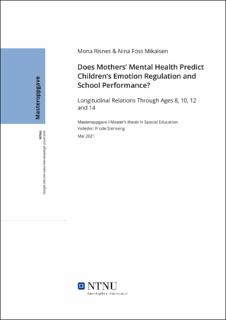| dc.description.abstract | Children need a secure and stable childhood in order for an optimal development across all stages. It is known that the mother or caregiver, the familial environment and the level of support stand as main mediators towards the child’s emotion regulation (ER), as well as their academic success. The motivation behind this study was to manifest a deeper explanation for children's difficulty with regulating emotions and their academic struggles. In the current study, using data from a community sample of 752 Norwegian children at ages 8, 10, 12 and 14, we tested the bi-directional relationship of maternal- depression and anxiety, emotion regulation and academic functioning. First, cross-sectional analyses showed that both maternal- depression and anxiety affected the child’s ER and their academic performance. Second, longitudinal analyses showed that maternal anxiety predicted the child’s weakened academic functioning from the ages 8 to 14, but not mediated through the child’s worsened emotional regulation. These findings emphasize the importance of focusing on maternal mental health, in the works of preventing children’s academic difficulties. | |
